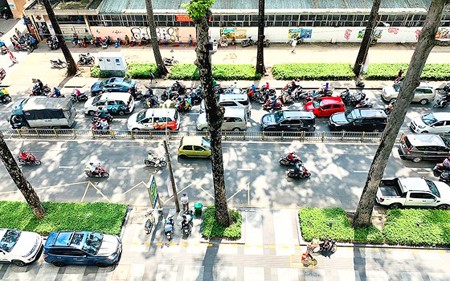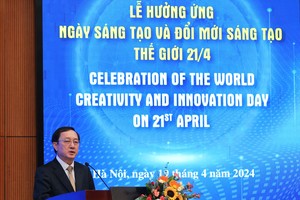
Technology must be feasible
In the conference, representatives of Bosch Company introduced the comprehensive solution for traffic in HCMC, including the prominent methods of smart parking lot and smart traffic management.
In the former one, the whole process of vehicles entering and then exiting the parking lot is closely monitored by a system of cameras that can 95 percent identify vehicle licenses as well as notify drivers of available space in the lot. In the latter, a series of cameras installed in intersections are linked to transfer information to the control center in order to identify traffic law violation such as running a red light or speeding, while delivering announcements from the center to traffic spots around the city.
According to Dr. Ha Viet Uyen Synh from the International University - Vietnam National University HCMC, after referring to many current approaches in the world to solve traffic problems, the research team of his university is able to develop a smart monitoring solution specially for HCMC via a system of cameras. The project has been piloted on Vo Van Kiet Street and has received very promising results since it can identify means of transport in real time with the preciseness of 84 percent, even in the bad condition of lack of light. With the ability to process 34 frame per second, it can catch situations like driving wrong way down one-way roads or parking inappropriately.
All introduced technologies focused on the compatibility with real conditions of streets and traffic in HCMC, especially in areas with difficulties in infrastructure.
Also, there is a high need for a standard procedure to process all information received and the legislative basis for fining violators using evidence from camera systems, along with a large amount of investment for very expensive equipment, to proceed the project to build a Control Center for Smart City as well as an Information Security Center, as said by representatives of District 10 and 12.
Technology must correspond with foundation system
After listening to questions from many districts in HCMC, Mr. Tran Ngoc Du, CEO of Infosoft, suggested that it is necessary to form a administrative foundation system for all districts in the city to clearly regulate which parts of smart traffic should observe international standards, and that newly implemented technologies must go along with this system.
According to Professor Doctor Nguyen Ky Phung, Deputy Director of the HCMC Department of Science and Technology, basically, smart city means applying information technology to connect sensors, hi-speed wireless networks, and processing big data in order to improve the living standards in urban areas, the administrative services of local authorities, while reducing the consumption of energy and effectively managing natural resources.
Dr. Phung also mentioned that thanks to this conference, the management, scientists, and businesses are able to increase their understanding about one another after discussing demand of each district. However, due to the variation in requests, there is an urgent need for a unified foundation system to successfully implement new technologies. The HCMC Department of Science and Technology is going to cooperate with related units to identify the optimal solution in the near future.
Even though the city announced the project to transform HCMC into a smart city at the end of 2017, the application of information technology into proceeding this project has encountered many obstacles such as a lack of a system to analyze information and then predict as well as support the municipal management to make decisions, a lack of standardized data to be timely and sufficiently delivered to those in need. Therefore, lately, the city has announced an architecture on smart city to be the base for the implementation of technology.
























